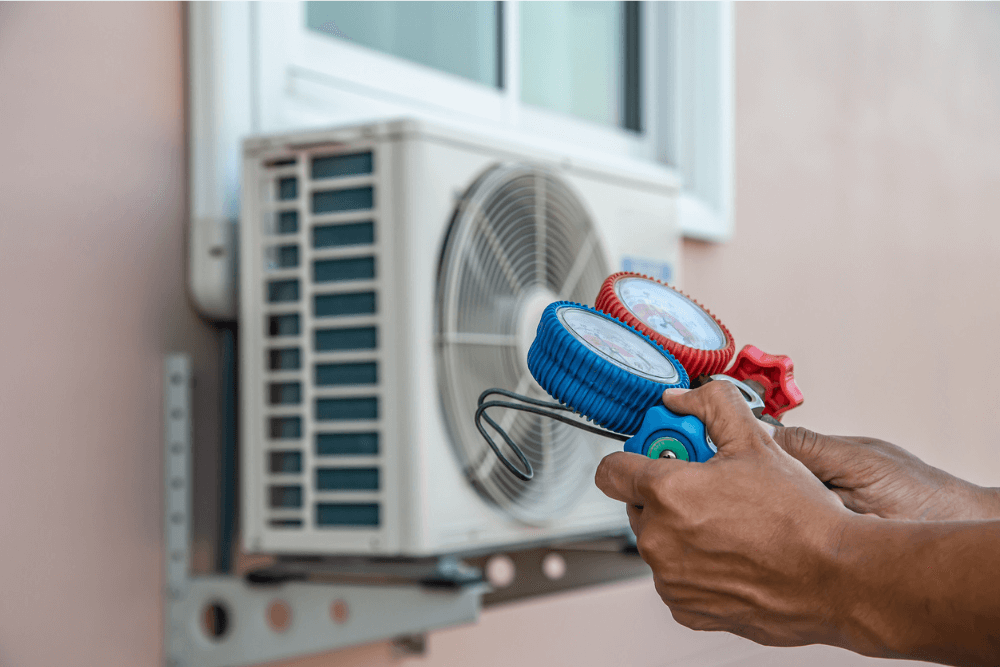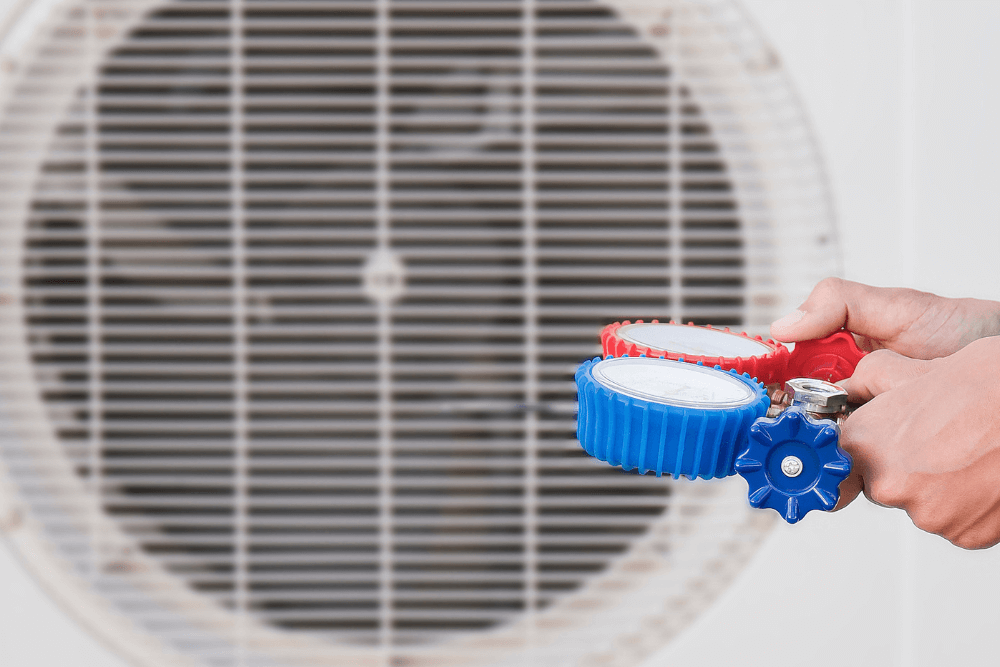What is refrigerant, and what does it do for your air conditioner? Those are the questions, and we have answers! Right now, this unique substance is your AC system’s life force. It’s time to explore the importance of refrigerants, how they work, and what you can do to keep them cool all summer!
Table of Contents
ToggleWhat is the Role of Refrigerant in AC Systems?
Your air conditioner has a substance inside of it called refrigerant. What does it do? Well, it’s responsible for cooling the air in your home by absorbing the heat and releasing it outside. As the refrigerant goes through your AC system, it transitions from liquid to gas and back to liquid again. This helps maintain a comfortable temperature during the hot Winnipeg summers.
Let’s slow down a bit. How does all of this work? Modern air conditioners pump refrigerant through using evaporator coils. The refrigerant absorbs heat from the indoor air and turns it into a gas. From there, the gas is moved to the condenser coils outside the unit, releasing the heat and turning it back into a liquid. This process is repeated to keep your home cool and comfortable.
What Types of Refrigerants Are Used in Air Conditioning Systems?
We know how refrigerants work, but did you know there are multiple types? Each is unique and does something different. Below are some of the most common types of refrigerants:
- R-22 (Freon): Formerly the most common type of refrigerant, R-22 was phased out due to its environmental impact. Eco-friendly alternatives have since replaced the high ozone depletion potential (ODP).
- R-410A (Puron): This refrigerant is the standard replacement for R-22. It is non-ozone-depleting, and transfers heat better, helping air conditioners run more effectively while reducing energy consumption.
- R-32: A global warming potential (GWP) makes R-32 the most environmentally friendly refrigerant. It’s commonly used in newer systems because it’s energy-efficient and has minimal environmental impact.
When choosing the proper refrigerant for your air conditioner, consider performance, energy efficiency, and environmental responsibility.

What Refrigerant Issues Are Common in Air Conditioners?
Refrigerant is essential to the cooling process. However, it’s not always foolproof. Occasionally, it can encounter problems, including:
- Refrigerant Leaks: Unfortunately, it’s not uncommon for refrigerant to leak out of air conditioning systems. These are often a result of cracks in the evaporator or condenser coils or faulty connections.
- Low Refrigerant Levels: If refrigerant levels drop, a system’s cooling power can decline, resulting in poor performance. This often occurs due to leaks or improper charging during installation or repairs. Choosing expert air conditioner installation helps prevent these problems and ensures optimal efficiency.
- Refrigerant Overcharge: Adding too much refrigerant to your air conditioning system can also lead to issues. An overcharged system will experience higher pressures, damaging internal components, and decreasing efficiency.
Regular air conditioning maintenance and proper refrigerant handling will keep your AC system in shape.
How Do You Maintain Refrigerant in Your AC System?
Maintenance is key to keeping your air conditioner in working order. It helps with long-term performance and efficiency. Here are some helpful tips:
- Regular Inspections: Call in an HVAC technician at least once per year. During an inspection, the technician will check the refrigerant levels, identify leaks, and ensure the system runs correctly, preventing unexpected breakdowns and costly repairs. Regular maintenance also helps avoid the need for affordable air conditioner repair by catching issues early.
- Annual Maintenance: Scheduling yearly air conditioner maintenance before the hot months roll around is essential. This gives the technician time to clean the evaporator and condenser coils, check refrigerant levels, and ensure the system works correctly.
- Fix Leaks Right Away: If your AC system isn’t keeping you cool or you think there’s been a refrigerant leak, fix it as soon as possible. If left untreated, leaks can lead to system damage, reduced efficiency, and higher energy bills.
Solving problems like these sooner rather than later can save you money.
Understand How Important Refrigerant is to Your Air Conditioning System!
Refrigerants are essential to cooling your home. You can keep your AC system in top shape by understanding the different types of refrigerants, common issues, and best maintenance practices.
The Lynn’s Plumbing, Heating & Cooling team can help if you’re having trouble with refrigerant levels. Contact us for professional air conditioning services today!




